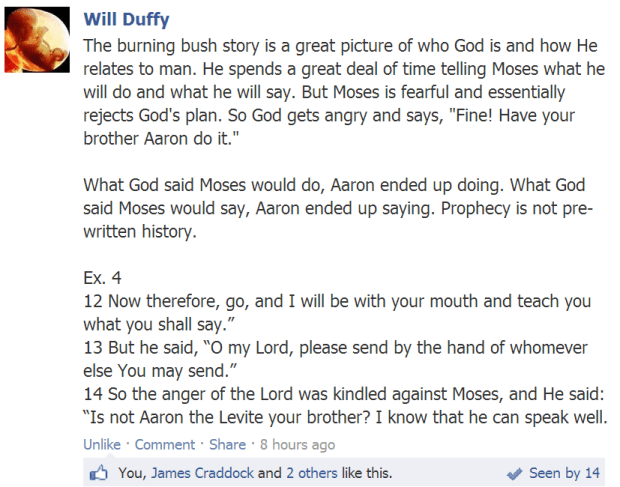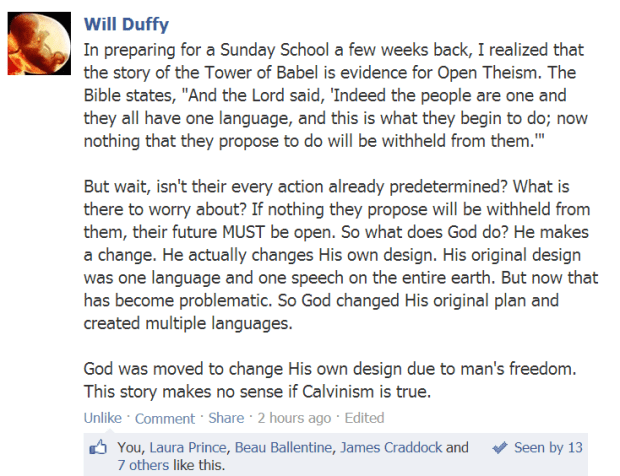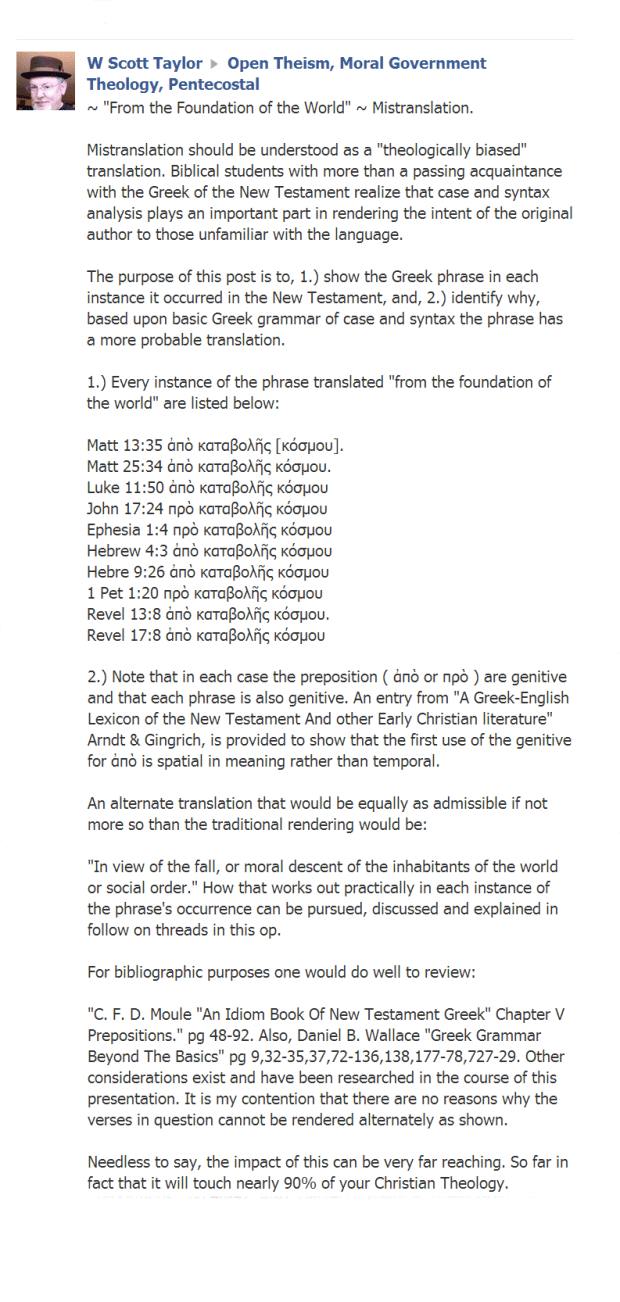Jesse Morrell gives a short scriptural defense of Open Theism followed by a well written defense. Here is the first part:
* God speaks of the future in terms of what may or may not be: Ex. 3:18, 4:9, 13:17; Eze.12:3; Jer. 36:3; 36:7
* God changes His plans in response to changing circumstances: Ex. 32:10-14, Jer. 18:1-10; Jonah 3:10
* God’s willingness to change His plans is considered one of His glorious attributes: Jonah 4:2; Joel 2:12-13
* God tests people to see what types of decisions they will make: Gen. 22:12; Ex. 16:4; Deut. 8:2, 13:1-3; 2 Chron. 32:31
* God has had disappointments and has regretted how things turned out: Gen. 6:5-6; 1 Sam. 15:10, 15:35
* God has expected things to happen that didn’t come to pass: Isa. 5:1-5; Jer. 3:6-7, 3:19-20
* God gets frustrated and grieved when he attempts to bring individuals into alignment with his will and they resist: Eze. 22:29-31; Isa. 63:10; Eph. 4:30; cf. Heb. 3:8, 3:15, 4:7; Acts 7:51
* The prayers of men have changed the plans of God (God changes the future: Ex. 32:10- 14; Num. 11:1-2, 14:12-20, 16:16:20-35; Deut. 9:13-14, 9:18-20, 9:25; 2 Sam. 24:17-25; 1 Kin. 21:27-29; 2 Kin. 20:6; 2 Chron. 12:5-8; Jer. 26:19; Isa. 38:5
* God is said to have repented (changed His mind) multiple times in the Bible: Gen. 6:6-7; Ex. 32:12-14; Num. 23:19; Deut. 32:36; Judges 2:18; 1 Sam. 15:11, 15:29, 15:35; 2Sam. 24:16; Ps. 90:13, 106:45, 110:4, 135:14; Jer. 4:28, 15:6, 18:8, 18:10, 20:16, 26:3, 26:13, 26:19, 42:10, Eze. 24:14, Hos. 11:8, 13:14; Joel 1:13-14; Amos 7:3, 7:6; Jonah 3:9-10, 4:2; Zach. 8:14
* Prophecies are often God foretelling what He Himself will later bring to pass. So they often have to do more with God’s omnipotence to bring about His plans then merely foreseeing the future: Gen. 3:15; 1 Kin. 8:15, 8:20, 8:24, 13:32 (with 2 Kin. 23:1-3, 15-18); 2 Kings 19:25; 2 Chron. 1:9 (1 Chron. 6:4; 10, 15); 2 Chron 36:21-22; Ezra 1:1; Isa. 5:19, 25:1-2, 37:26, 42:9 (with vs. 16); 46:10; Jer. 29:10, 32:24, 32:28, 33:14-15, Lam. 3:37; Eze. 12:25, 17:24, 33:29, 33:33; Dan. 4:33, 4:37; Acts 3:18, 27:32-35; Rev. 17:17. This type of prophecy includes the prophecies of the Messiah. So His birth, the location of His birth, the miracle of His birth, were not accidents or merely foreseen events, but were the deliberate plan of God (Gen. 3:15; Isa. 9:6; 53:6; Acts 2:23, 4:28)
* The future is partly open (undetermined, uncertain): Ex. 3:18, 4:9, 13:17; Eze. 12:3; Gen. 22:12; Ex. 16:4; Deut. 8:2, 13:1-3; Jdg. 2:20-22, Jdg. 3:4, Ex. 33:2, Ex. 34:24; 1 Sam. 2:30, 2 Chron. 12:6-7, 2 Chron. 16:9; 2 Chron. 32:31; Ps. 81:13-14; Isa. 5:1-5; Jer. 3:6-7, 3:19-20; Matt. 24:20; 26:53; Mk. 13:20.
* The future is partly settled (determined, certain): Gen. 3:15; 1 Kin. 8:15, 8:20, 8:24, 13:32 (with 2 Kin. 23:1-3, 15-18); 2 Kings 19:25; 2 Chron. 1:9 (1 Chron. 6:4; 10, 15); 2 Chron 36:21-22; Ezra 1:1; Isa. 5:19, 25:1-2, 37:26, 42:9 (with vs. 16); Jer. 29:10, 32:24, 32:28, 33:14-15, Lam. 3:37; Eze. 12:25, 17:24, 33:29, 33:33; Dan. 4:33, 4:37; Acts 3:18, 27:32-35; Rev. 17:17; Gen. 3:15; Isa. 9:6; 53:6; Acts 2:23, 4:28.
* The future can be changed: Gen. 19:17-22; Ex. 32:10-14, Jer. 18:1-10; Ex. 32:10-14; Num.11:1-2, 14:12-20, 16:20-35; Deut. 9:13-14, 9:18-20, 9:25; 2 Sam. 24:17-25; 1 Kin. 21:27-29; 2 Kin. 20:6; 2 Chron. 12:5-8; Jer. 26:19; Isa. 38:5; Matt. 24:20; Mk. 13:20;
* Scriptures that say God has a past, present, and a future: Jn. 1:14; Rev. 1:4, 1:8, 4:8; 5:12;
* Scriptures that say God’s eternity is endless time, that is, time without beginning or end: Isa. 9:6-7; Isa. 43:10; Isa. 57:15; Job 36:26; Dan. 4:34; Hab. 1:12 Ps. 23:2; Ps. 90:2; Ps. 102:24; Ps. 102:27; Lk. 1:33; Heb 1:12; Rev 1:4; Rev. 1:8; Rev. 4:8; Rev. 5:14;
* Scriptures that say man’s eternity is endless time: Isa. 45:17; Eph. 3:21; Rev. 14:11;
* Scriptures that say eternity is endless time for Heavenly creatures: Rev. 4:8
* Eternity is time without end (endless time instead of timelessness): Isa. 9:6-7; Isa. 43:10; Isa. 57:15; Job 36:26; Dan. 4:34; Hab. 1:12 Ps. 23:2; Ps. 90:2; Ps. 102:24; Ps. 102:27; Lk. 1:33; Heb 1:12; Rev 1:4; Rev. 1:8; Rev. 4:8; Rev. 5:14; Isa. 45:17; Eph. 3:21; Rev. 14:11






